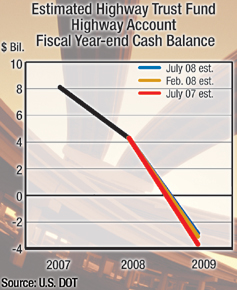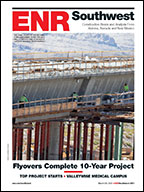A new Bush administration update of the Highway Trust Fund’s financial health surprisingly projects a slightly smaller fiscal 2009 deficit than it estimated in February. Industry and state officials expected the numbers would be worse, but they are continuing to urge Congress to add revenue to close the trust-fund gap.
 Giuy Lawrence / ENR Varying numbers show deficit.
|
The new numbers, released by the Office of Management and Budget on July 28, peg the year-end 2009 shortfall in the trust fund’s highway account at $3.1 billion, compared with a $3.2-billion deficit forecast in February. Observers expected the gap to have widened.
Transportation Secretary Mary Peters says trust-fund receipts now are estimated to be $1.5 billion less than predicted, but highway outlays also are forecast to decline by $1.6 billion. A drop in trust-fund income isn’t unexpected, says William Buechner, American Road and Transportation Builders Association vice president for economics and research. “What was unexpected was that they also adjusted their outlay forecast,” he adds.
Peters says DOT officials are trying to determine why outlays are down. Buechner points to a possible answer. He says about $12 billion that the 2005 SAFETEA-LU law authorized for earmarked projects has not yet been obligated. “There’s a lot of projects that just haven’t gotten under way,” he says.
Buechner says projects worth $1 billion were stalled because SAFETEA-LU had incorrect route numbers or other inaccuracies. That wasn’t rectified until a technical corrections bill was signed, on June 6.
Steve Hall, American Council of Engineering Companies’ vice president for government affairs, says the size of the trust-fund shortfall “certainly doesn’t lessen the urgency for getting the problem fixed.” The House on July 23 passed a bill to shift $8 billion from the general fund to the trust fund. In the Senate, Finance Committee Chairman Max Baucus (D-Mont.) included a similar “fix” in a tax bill he introduced on July 24.
DOT also reported highway travel fell 3.7% in May, the seventh-straight monthly decline. Peters says that trend emphasizes the gasoline tax is “an antiquated mechanism.” On July 29, she released proposals to overhaul surface transportation. They include narrowing the federal focus to areas such as safety and maintaining the Interstate system, a new flexible fund for metropolitan areas, expediting project reviews and increasing use of private-sector funds.
Hall said it’s good to discuss such ideas, but with a new administration and Congress next year, “You do have to question how much, at this stage of the game, it’s going to affect the process.”


Post a comment to this article
Report Abusive Comment